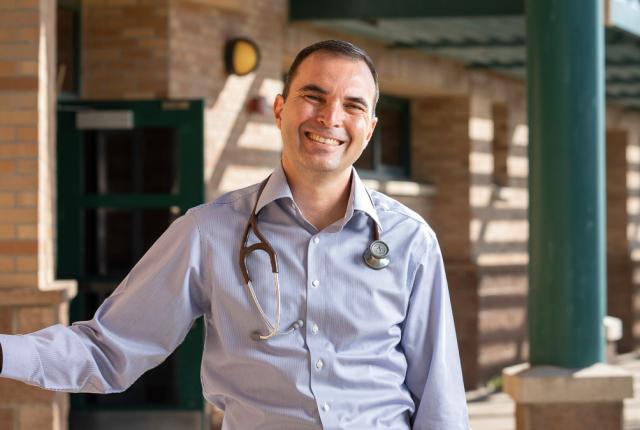Matt Probst stands outside El Centro clinic in Las Vegas. Photograph by Gabriella Marks.
MATT PROBST WAS HAVING A VERY BUSY 2019. The physician’s assistant and medical director of El Centro Family Health, based in Española, was traveling to health conferences and film screenings as he brought attention to America’s rural healthcare crisis.
His appearance in the PBS documentary The Providers, which focused on the efforts of health professionals at El Centro to bring much-needed help to low-income, elderly, and marginalized patients in rural communities of northern New Mexico, gave him a voice. And he was using it to help spread the message that facilities like his were desperately needed in much of America.
Even with all the attention and the awards (Probst was named Physician Assistant of the Year by the American Academy of Physician Assistants in April 2019), he had a nagging feeling that more needed to be done. “We had trophies on the wall, but no meat in the freezer,” says Probst, a bowhunter and father to four boys.
When a dear patient passed away, Probst was devastated. “I felt I needed to do something about it,” he recalls.
A driven problem solver, according to El Centro CEO Lore Pease, Probst zeroed in on how the issues plaguing his patients could be addressed—starting with the young. “He is on a mission to help and serve the communities that El Centro serves,” says Pease.
So Probst, State Senator Pete Campos, and authors of the book 100% Community, Katherine Ortega Courtney and Dominic Cappello, launched the 100% Community Initiative. The San Miguel County project was designed to prevent the adverse childhood experiences that lead to trauma and marginalization—situations ranging from emotional, physical, or sexual abuse to living in a household where divorce, substance abuse, or mental illness exists.
Probst was no novice to those issues. In The Providers, he candidly recounted his sister’s journey through substance abuse and the tragedy of his father’s addiction. He knew firsthand the importance of education and support.
The group gathered state legislators, city council and county commission members, school officials, and others into action groups and urged everyone to read 100% Community. Then they began working to implement vital services—community schools, healthy food access, youth mentoring, housing, transportation, and more—to create better community health outcomes. For their initial project, they had plans to transform a vacant building in Las Vegas into a youth center where kids would have access to food and tutoring. In addition, there would be gardens and cultural activities.
“When COVID hit, it became bigger than that,” Probst says.
The epidemic of childhood trauma was colliding with a global pandemic. “So we mobilized,” he says. The action groups transitioned into pandemic response. Probst and the El Centro team, for example, set up 12 testing sites in San Miguel County, while helping with six others. In April, they tested 200 of the most vulnerable citizens.
As the school year began, Probst was working with officials on how to develop a safe and workable return to in-person education—all while continuing to see patients at El Centro.
His work has never been confined to boardrooms or hospital exam rooms, says Pease, but extends to lawmakers and community members, “so we are one in trying to serve our people.”
“It’s 100 percent community care, and that’s the drive,” Pease says. “He truly is an advocate for all people.”


